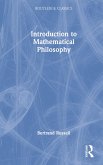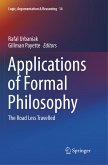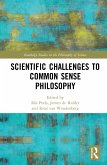New Challenges to Philosophy of Science
Herausgegeben:Andersen, Hanne; Dieks, Dennis; Gonzalez, Wenceslao J.; Uebel, Thomas; Wheeler, Gregory
New Challenges to Philosophy of Science
Herausgegeben:Andersen, Hanne; Dieks, Dennis; Gonzalez, Wenceslao J.; Uebel, Thomas; Wheeler, Gregory
- Gebundenes Buch
- Merkliste
- Auf die Merkliste
- Bewerten Bewerten
- Teilen
- Produkt teilen
- Produkterinnerung
- Produkterinnerung
This volume is a serious attempt to open up the subject of European philosophy of science to real thought, and provide the structural basis for the interdisciplinary development of its specialist fields, but also to provoke reflection on the idea of 'European philosophy of science'. This efforts should foster a contemporaneous reflection on what might be meant by philosophy of science in Europe and European philosophy of science, and how in fact awareness of it could assist philosophers interpret and motivate their research through a stronger collective identity. The overarching aim is to set…mehr
Andere Kunden interessierten sich auch für
![New Challenges to Philosophy of Science New Challenges to Philosophy of Science]() New Challenges to Philosophy of Science116,99 €
New Challenges to Philosophy of Science116,99 €![Introduction to Mathematical Philosophy Introduction to Mathematical Philosophy]() Bertrand RussellIntroduction to Mathematical Philosophy187,99 €
Bertrand RussellIntroduction to Mathematical Philosophy187,99 €![Challenges to the Enlightenment Challenges to the Enlightenment]() Academy of HumanismChallenges to the Enlightenment34,99 €
Academy of HumanismChallenges to the Enlightenment34,99 €![The Ethical Challenges of Academic Administration The Ethical Challenges of Academic Administration]() The Ethical Challenges of Academic Administration77,99 €
The Ethical Challenges of Academic Administration77,99 €![Too Conscientious: The Evolution of Ethical Challenges to Professionalism in the American Medical Marketplace Too Conscientious: The Evolution of Ethical Challenges to Professionalism in the American Medical Marketplace]() Douglas E. LemleyToo Conscientious: The Evolution of Ethical Challenges to Professionalism in the American Medical Marketplace93,99 €
Douglas E. LemleyToo Conscientious: The Evolution of Ethical Challenges to Professionalism in the American Medical Marketplace93,99 €![Applications of Formal Philosophy Applications of Formal Philosophy]() Applications of Formal Philosophy39,99 €
Applications of Formal Philosophy39,99 €![Scientific Challenges to Common Sense Philosophy Scientific Challenges to Common Sense Philosophy]() Scientific Challenges to Common Sense Philosophy198,99 €
Scientific Challenges to Common Sense Philosophy198,99 €-
-
-
This volume is a serious attempt to open up the subject of European philosophy of science to real thought, and provide the structural basis for the interdisciplinary development of its specialist fields, but also to provoke reflection on the idea of 'European philosophy of science'. This efforts should foster a contemporaneous reflection on what might be meant by philosophy of science in Europe and European philosophy of science, and how in fact awareness of it could assist philosophers interpret and motivate their research through a stronger collective identity. The overarching aim is to set the background for a collaborative project organising, systematising, and ultimately forging an identity for, European philosophy of science by creating research structures and developing research networks across Europe to promote its development.
Produktdetails
- Produktdetails
- The Philosophy of Science in a European Perspective 4
- Verlag: Springer / Springer Netherlands
- Artikelnr. des Verlages: 978-94-007-5844-5
- 2013
- Seitenzahl: 520
- Erscheinungstermin: 11. Juni 2013
- Englisch
- Abmessung: 241mm x 160mm x 33mm
- Gewicht: 906g
- ISBN-13: 9789400758445
- ISBN-10: 9400758448
- Artikelnr.: 36612311
- Herstellerkennzeichnung Die Herstellerinformationen sind derzeit nicht verfügbar.
- The Philosophy of Science in a European Perspective 4
- Verlag: Springer / Springer Netherlands
- Artikelnr. des Verlages: 978-94-007-5844-5
- 2013
- Seitenzahl: 520
- Erscheinungstermin: 11. Juni 2013
- Englisch
- Abmessung: 241mm x 160mm x 33mm
- Gewicht: 906g
- ISBN-13: 9789400758445
- ISBN-10: 9400758448
- Artikelnr.: 36612311
- Herstellerkennzeichnung Die Herstellerinformationen sind derzeit nicht verfügbar.
Wenceslao J. Gonzalez, Preface,- Teams A and D: The Philosophy of Computer Science and Artificial Intelligence.- Jesse Alama, Reinhard Kahle, Computing with Mathematical Arguments.- Dennis Dieks, Is There a Unique Physical Entropy? Micro versus Macro.- Luciano Floridi, A Defence of the Principle of Information Closure against the Sceptical Objection.- Roberto Giuntini, Hector Freytes, Antonio Ledda, Giuseppe Sergioli, Probabilistic Logics in Quantum Computation.- Alexei Grinbaum, Quantum Observer, Information Theory and Kolmogorov Complexity.- Leon Horsten, Mathematical Philosophy?.- Ulriche Pompe, The Value of Computer Science for Brain Research.- Sam Sanders, On Algorithm and Robustness in a Non-standard Sense.- Francisco C. Santos, Jorge M. Pacheco, Behavioral Dynamics under Climate Change Dilemmas.- Sonja Smets, Reasoning about Quantum Actions: A Logician's Perspective.- Leszek Wronski, Branching Space-Times and Parallel Processing.- Team B: Philosophy of Systems Biology.- Gabriele Gramelsberger, Simulation and System Understanding.- Tarja Knuuttila, Andrea Loettgers, Synthetic Biology as an Engineering Science? Analogical Reasoning, Synthetic Modeling, and Integration.- Anders Strand, Gry Oftedal, Causation and Counterfactual Dependence in Robust Biological Systems.- Melinda Bonnie Fagan, Experimenting Communities in Stem Cell Biology: Exemplars and Interdisciplinarity.- William Bechtel, From Molecules to Networks: Adoption of Systems Approaches in Circadian Rhythm Research.- Olaf Wolkenhauer, Jan-Hendrik Hofmeyr, Interdisciplinarity as both Necessity and Hurdle for Progress in the Life Sciences.- Team C: The Sciences of the Artificial vs. the Cultural and Social Sciences.- Amparo Gómez, Archaeology and Scientific Explanation: Naturalism, Interpretivism and 'A Third Way'.- Demetris Portides, Idealization in Economics Modeling.- Ilkka Niiniluoto, On the Philosophy of Applied Social Sciences.- Arto Siitonen, The Status of Library Science: From Classification to Digitalization.- Paolo Garbolino, The Scientification of Forensic Practice.- Wenceslao J. Gonzalez, The Sciences of Design as Sciences of Complexity: The Dynamic Trait.- Subrata Dasgupta, Epistemic Complexity and the Sciences of the Artificial.- María José Arrojo, Communication Sciences as Sciences of the Artificial: The Analysis of the Digital Terrestrial Television.- Team E: The Philosophy of the Sciences that Received Philosophy of Science Neglected: Historical Perspective.- Elisabeth Nemeth, The Philosophy of the Other Austrian Economics.- Veronika Hofer, Philosophy of Biology in Early Logical Empiricism.- Julie Zahle, Participant Observation and Objectivity in Anthropology.- Jean-Marc Drouin, Three Philosophical Approaches to Entomology.- Anastasios Brenner, François Henn, Chemistry and French Philosophy of Science. A Comparison of Historical and Contemporary Views.- Cristina Chimisso, The Life Sciences and French Philosophy of Science: Georges Canguilhem on Norms.- Massimo Ferrari, Neglected History: Giulio Preti, the Italian Philosophy of Science, and the Neo-Kantian Tradition.- Thomas Mormann, Topology as an Issue for History of Philosophy of Science.- Graham Stevens, Philosophy, Linguistics, and the Philosophy of Linguistics.- PSE Symposium at EPSA 2011: New Challenges to Philosophy of Science.- Olav Gjelsvik, Philosophy as Interdisciplinary Research.- Theo Kuipers, Philosophy of Design Research.- Raffaella Campaner, Philosophy of Medicine and Model Design.- Roman Frigg, Seamus Bradley, Reason L. Machete, Leonard A. Smith, Probabilistic Forecasting: Why Model Imperfection Is a Poison Pill.- Daniel Andler, Dissensus in Science as a Fact and as a Norm.
Wenceslao J. Gonzalez, Preface,- Teams A and D: The Philosophy of Computer Science and Artificial Intelligence.- Jesse Alama, Reinhard Kahle, Computing with Mathematical Arguments.- Dennis Dieks, Is There a Unique Physical Entropy? Micro versus Macro.- Luciano Floridi, A Defence of the Principle of Information Closure against the Sceptical Objection.- Roberto Giuntini, Hector Freytes, Antonio Ledda, Giuseppe Sergioli, Probabilistic Logics in Quantum Computation.- Alexei Grinbaum, Quantum Observer, Information Theory and Kolmogorov Complexity.- Leon Horsten, Mathematical Philosophy?.- Ulriche Pompe, The Value of Computer Science for Brain Research.- Sam Sanders, On Algorithm and Robustness in a Non-standard Sense.- Francisco C. Santos, Jorge M. Pacheco, Behavioral Dynamics under Climate Change Dilemmas.- Sonja Smets, Reasoning about Quantum Actions: A Logician's Perspective.- Leszek Wronski, Branching Space-Times and Parallel Processing.- Team B: Philosophy of Systems Biology.- Gabriele Gramelsberger, Simulation and System Understanding.- Tarja Knuuttila, Andrea Loettgers, Synthetic Biology as an Engineering Science? Analogical Reasoning, Synthetic Modeling, and Integration.- Anders Strand, Gry Oftedal, Causation and Counterfactual Dependence in Robust Biological Systems.- Melinda Bonnie Fagan, Experimenting Communities in Stem Cell Biology: Exemplars and Interdisciplinarity.- William Bechtel, From Molecules to Networks: Adoption of Systems Approaches in Circadian Rhythm Research.- Olaf Wolkenhauer, Jan-Hendrik Hofmeyr, Interdisciplinarity as both Necessity and Hurdle for Progress in the Life Sciences.- Team C: The Sciences of the Artificial vs. the Cultural and Social Sciences.- Amparo Gómez, Archaeology and Scientific Explanation: Naturalism, Interpretivism and 'A Third Way'.- Demetris Portides, Idealization in Economics Modeling.- Ilkka Niiniluoto, On the Philosophy of Applied Social Sciences.- Arto Siitonen, The Status of Library Science: From Classification to Digitalization.- Paolo Garbolino, The Scientification of Forensic Practice.- Wenceslao J. Gonzalez, The Sciences of Design as Sciences of Complexity: The Dynamic Trait.- Subrata Dasgupta, Epistemic Complexity and the Sciences of the Artificial.- María José Arrojo, Communication Sciences as Sciences of the Artificial: The Analysis of the Digital Terrestrial Television.- Team E: The Philosophy of the Sciences that Received Philosophy of Science Neglected: Historical Perspective.- Elisabeth Nemeth, The Philosophy of the Other Austrian Economics.- Veronika Hofer, Philosophy of Biology in Early Logical Empiricism.- Julie Zahle, Participant Observation and Objectivity in Anthropology.- Jean-Marc Drouin, Three Philosophical Approaches to Entomology.- Anastasios Brenner, François Henn, Chemistry and French Philosophy of Science. A Comparison of Historical and Contemporary Views.- Cristina Chimisso, The Life Sciences and French Philosophy of Science: Georges Canguilhem on Norms.- Massimo Ferrari, Neglected History: Giulio Preti, the Italian Philosophy of Science, and the Neo-Kantian Tradition.- Thomas Mormann, Topology as an Issue for History of Philosophy of Science.- Graham Stevens, Philosophy, Linguistics, and the Philosophy of Linguistics.- PSE Symposium at EPSA 2011: New Challenges to Philosophy of Science.- Olav Gjelsvik, Philosophy as Interdisciplinary Research.- Theo Kuipers, Philosophy of Design Research.- Raffaella Campaner, Philosophy of Medicine and Model Design.- Roman Frigg, Seamus Bradley, Reason L. Machete, Leonard A. Smith, Probabilistic Forecasting: Why Model Imperfection Is a Poison Pill.- Daniel Andler, Dissensus in Science as a Fact and as a Norm.








